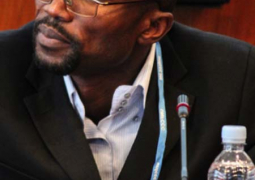Safe
Hands For Girls (SHFGs) with funding from UNICEF Thursday trained 60 students
in the Greater Banjul Area on Female Genital Mutilation (FGM) and advocacy, at
the NaNA conference hall.
The
two-day training course, which was part of the national school outreach on
sensitising students on the health complications of FGM, brought students from
different schools in the Kanifing Municipality.
According
to Mam Lisa Camara, Coordinator of SHFGs, the aim of the training course was to
sensitise students about the effects of FGM, and to increase awareness on
health complications of FGM and to further get them to take part in advocacy.
She
said after the two-day training course, they are hoping that the students take
the initiative to continue advocating in their various schools.
Hayrullo
Malikov, Social Protection Specialist at UNICEF, expressed gratitude to SHFGs,
and for seeing young girls been involved in FGM advocacy, as well as for
fighting for the rights of children and girls, as well as training them on how
to eliminate the act and disseminate the information.
He
said UNICEF is a global organisation mandated for the implementation and
protection of children’s rights, adding that there are fundamental rights of
children which if denied violate their rights.
He
explained that the right to survival is the right to access health, describing
it to be the most important right of the child.
Mr
Malikov said looking at this right, FGM is trying to violate two most important
rights of children, which are access to health and being healthy, and the
second is the protection right of the child.
This,
he said, is violating the rights of children as it is affecting the child’s
well-being, adding that FGM is a harmful traditional practice and needs to be
addressed.
He
further added that UNICEF would continue to partner with child protection
organisations to fight against any harmful practice that affects children and
girls, especially on the issue of FGM.
Mustapha
Drammeh of MoBSE said FGM is internationally described as a human rights
violation, adding that it is more of a women’s rights violation and of children
and the person’s right to health.
He
thanked the president for his intervention during his dialogue with the
people’s tour in banning one of the most harmful human rights violations.
“FGM
has no health benefits, and harms both women and girls in many ways,” he said.
Mr
Drammeh added that the act involves moving and damaging the female genital
tissues, including their general body.
He
called upon parents, teachers and students to work on ending FGM, and making
Gambia an FGM-free country.
He
thanked SHFGs for their invaluable support, and for involving students in FGM
and advocacy to know more about the act, and for the good initiative to fight for
the rights of girls and children in The Gambia.
The
Director of Social Welfare, Fanta Bai Secka, also added that a lot of
information has been disseminated regarding FGM countrywide to stop the act.
She
said people need to talk to each other and continue to sensitise on the harms,
adding that this is a deep-rooted traditional belief for which individuals also
need to change their mindset within time.
“It has health implications on girls, and also
reduces their self-esteem”.
The
Director also emphasised that more men should be involved in the sensitisation
even though the operation is done in women, and that they should be involved to
understand and to support the women in making informed decisions, when it comes
to FGM and to also make them understand the law.
She
advised the students to continue to talk to their parents; to also advocate
within their communities as they are all coming from different communities.
“Talk
to your friends, talk to your brother and also talk to the elders within your
community, because they are the circumcisers.”
She
also urged them to create awareness at the home, as once awareness is created
at the homes, certainly there would be a change of mindset and the country
would be FGM-free.
“My
department will continue to commit its support to SHFGs in your advocacy work,
so that we will be able to protect girls and young children from harmful
traditional practices”.
The
Women’s Bureau representative, Ndey Fatou Jobe Sanyang, said such training
programmes are important to involve children in order for them to understand
the effects of FGM and its health implications.
She
added that protecting the rights of the girl-child could not be overemphasised.
She
pointed out that in The Gambia, the practice is deep-rooted, with a prevalence rate
of 76.3 per cent among women within the ages of 15 to 49 years in 2015 compared
to 74.3 per cent in 2005.
Mrs
Jobe Sanyang disclosed that the 2013 demographic survey highlighted by Gambia
Bureau of Statistics (GBoS) and the Ministry of Social Welfare stated that the
national prevalence for FGM reduced marginally by 3 per cent from 78 to 74.9
per cent, which indicates that there is a clear evidence that FGM is still
harmful to the women’s physical health throughout their lives.


